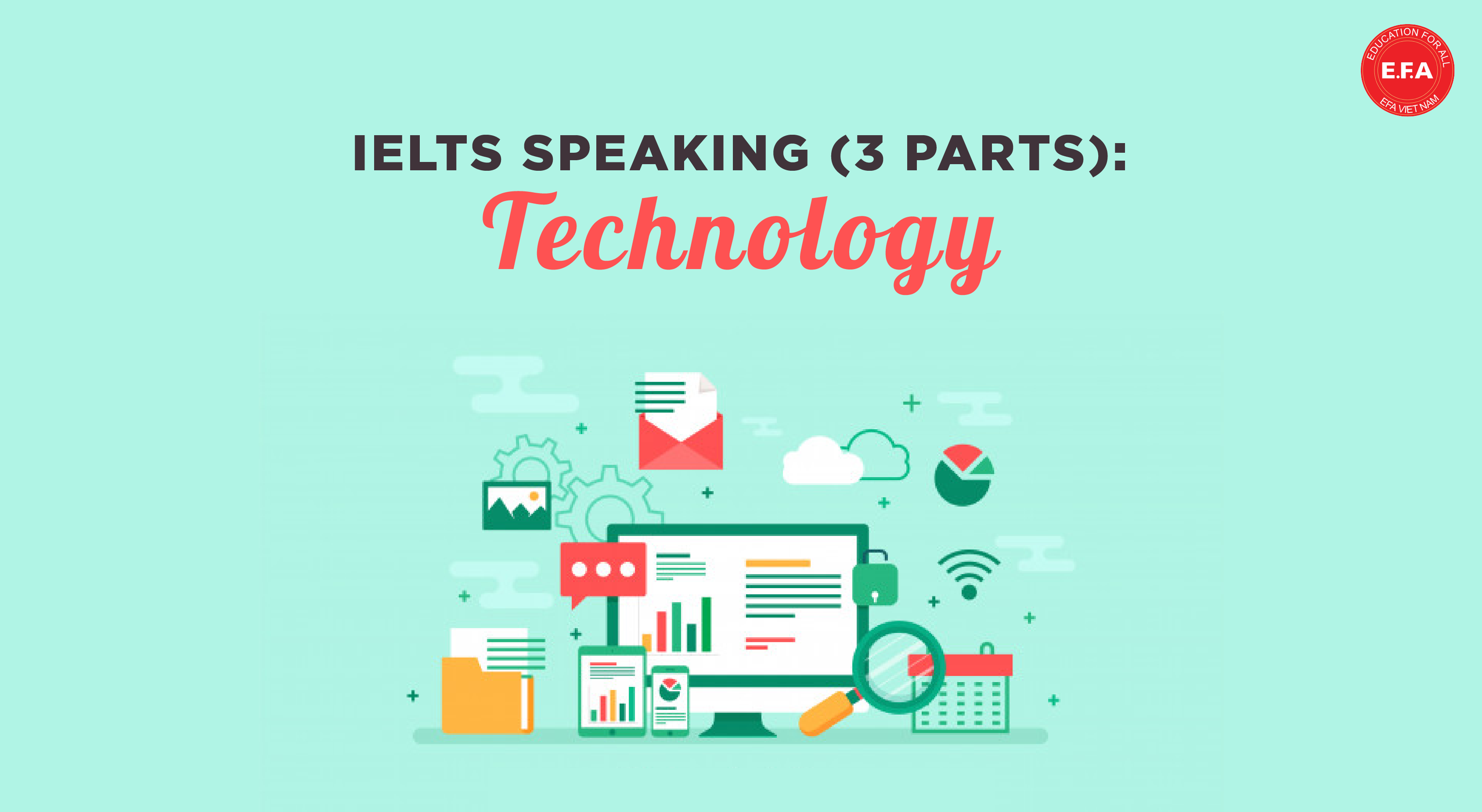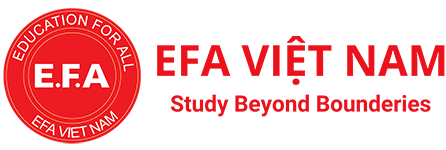Chủ đề của ‘Technology, thường xuyên xuất hiện trong kỳ thi IELTS đặc biệt trong phần speaking. Bạn cần phải cho giám khảo thấy khả năng diễn đạt của bạn bằng cách sử dụng phạm vi từ vựng càng rộng càng tốt. Vì vậy EFA Việt Nam sẽ tổng hợp giúp bạn những từ vựng cũng như cách sử dụng từ trong những bối cảnh khác nhau liên quan đến chủ đề Technology. Cùng EFA Việt Nam học tiếng Anh thôi nào.

Nội dung bài viết
1. Các dạng mẫu câu hỏi – câu trả lời.
Part 1: Style questions.
Examiner: Do you enjoy using technology?
Stephan: Well … I wouldn’t call myself a techie or a computer buff but I enjoy using computers … I’d like to find out more about how they work … when my computer crashes I never know what to do.
Examiner: Do you use the Internet for your studies?
Sophie: Yes … I’d be lost without it … I do lots of video conferencing to practise speaking and social media like Facebook is a good way to meet up with other students … and I download podcasts that teach English vocabulary and grammar.
Examiner: Do you have your own computer?
Tania: Yes … I have a Macbook Pro … I use it all the time … for word processing … browsing websites and catching up with TV programmes I’ve missed.
Part 2: Style task.
Describe an item of technology you have that is very important. You should say:
- what the technology is
- when you got it
- how often you use it
and say how different your daily life would be without it.
Mattie: I don’t have many gadgets … just a computer … a laptop and my mobile phone … but I’ll talk about my computer as it’s so useful … it’s funny really … 2 years ago I was still learning to use computers … how to use email … send attachments how to access websites … then I decided to do a digital editing course for video and photography … and so I bought the laptop when I started the course … my husband had a desktop PC but it was very slow so I decided to upgrade to a powerful one because we do a lot of video editing on the course … it’s a high-spec laptop … very fast … the latest operating system … it boots up really quickly and it’s fun to use so it makes working a pleasure …
Part 3: Style questions.
Examiner: What do you think are the important things people need to learn when they start using computers?
Alejandro: Well … there are things like how to use the Internet … how to enter a web address … how to navigate websites … that kind of thing but it’s also important to know how to back up your files in case your computer crashes … and all about Internet security.
Examiner: What kind of technological developments have made the biggest impact on our lives?
Faydene: In my lifetime it has to be the Internet of course but I also think wifi has made a huge difference to how we interact with the Internet … wireless networks at home and public wifi hotspots mean we can go online easily … access our mail … log into our work intranet and basically be connected wherever we are.
Examiner: Do computers make it much easier to study?
Jane: Definitely yes … researching information is much easier with the Internet .. you can bookmark webpages for future reference and writing essays is much easier … being able to cut and paste sections of text means you can experiment with organisation … so yes … compared to years ago when you had a pile of books on your desk and a pen and paper … it’s now much easier.
2. Một số từ vựng liên quan.
- to access websites/email: để xác định vị trí.
- to back up files: để tạo một bản sao của các tập tin trong trường hợp máy tính gặp sự cố.
- to boot up: để khởi động máy tính.
- to bookmark a webpage: để đánh dấu một trang web để tham khảo trong tương lai.
- to browse websites: để xem các trang web.
- a computer buff: một người sử dụng máy tính chuyên gia.
- to crash: đột nhiên ngừng hoạt động.
- to cut and paste: để di chuyển văn bản hoặc hình ảnh từ một nơi trong tài liệu sang nơi khác.
- a desktop PC: máy tính cố định.
- digital editing:để chỉnh sửa các tài liệu kỹ thuật số như tệp âm thanh hoặc video.
- download (podcasts):để lưu một bản sao của một tập tin từ internet vào thiết bị của riêng bạn.
- to enter a web address: để nhập địa chỉ của một trang web vào thanh địa chỉ của trình duyệt của bạn.
- a gadget: một công cụ công nghệ như điện thoại di động hoặc máy ảnh.
- to go online: sử dụng Internet.
- high-spec (laptop):máy tính mạnh mẽ với các thành phần chất lượng hàng đầu.
- Internet security: an toàn mạng Internet.
- intranet: một mạng lưới các máy tính được kết nối trong một tổ chức mà khách truy cập trái phép không thể truy cập.
- to navigate a website:để tìm đường trên một trang web.
- operating system: phần mềm nói cho máy tính biết cách làm việc.
- send an attachment: gửi email với một tập tin đi kèm.
- social media: phương tiện được sử dụng để tương tác với những người khác như Facebook hoặc Twitter.
- to surf the web: lần lượt xem một loạt các trang web.
- a techie: ai đó có hứng thú với công nghệ.
- to upgrade: để có được một phần mềm hoặc phần mềm mạnh hơn hoặc giàu tính năng.
- video conferencing: để xem và nghe mọi người từ các địa điểm khác nhau bằng Internet.
- wireless hotspot: một nơi công cộng nơi bạn có thể truy cập Internet.
- wireless network: một mạng nơi người dùng có thể truy cập Internet mà không cần sử dụng cáp cố định.
- word processing; sản xuất văn bản trên máy tính.
IELTS Vocabulary: Bạn có chắc đã biết hết từ vựng về chủ đề gia đình trong tiếng Anh?
Đó là những từ vựng cũng như vận dụng chúng trong từng trường hợp giao tiếp. Các bạn hãy ôn luyện hàng ngày để có thể làm chủ trong những đoạn giao tiếp hàng ngày nhé. EFA Việt Nam chúc bạn sớm chinh phục được tiếng Anh nhé!
